
Forest and Society
Scope & Guideline
Uniting voices for sustainable forest management.
Introduction
Aims and Scopes
- Social-Environmental Justice:
The journal explores the implications of forest policies on marginalized communities, emphasizing the need for equitable access to resources and participatory governance. - Community-Based Resource Management:
Research often highlights the role of local communities in forest management, focusing on indigenous practices, community forestry, and agroforestry as sustainable approaches to resource utilization. - Livelihood Diversification:
The journal addresses how forest resources contribute to the livelihoods of rural populations, examining strategies for diversification and adaptation amidst environmental and economic changes. - Agroforestry and Sustainable Development:
There is a significant focus on agroforestry systems, exploring their potential to enhance biodiversity, improve land productivity, and support local economies. - Impact of Climate Change and Policy Responses:
The journal investigates the effects of climate change on forest ecosystems and the adaptive strategies employed by communities, alongside the role of policy in facilitating these adaptations. - Ecosystem Services and Governance:
Research includes assessments of ecosystem services provided by forests and the governance frameworks necessary to manage these services effectively.
Trending and Emerging
- Post-Pandemic Recovery and Resilience:
Recent publications are increasingly addressing the impacts of the COVID-19 pandemic on forest-dependent communities, focusing on recovery strategies and the resilience of livelihoods. - Intersection of Gender and Forestry:
There is a growing emphasis on gender perspectives within forestry research, particularly concerning the roles of women in forest management and conservation efforts. - Participatory Governance and Social Networks:
Research is trending towards understanding the role of social networks and participatory governance in enhancing community engagement and effectiveness in forest management. - Climate Change Adaptation Strategies:
A notable increase in studies exploring adaptation strategies for communities facing climate change impacts highlights the urgency of addressing environmental challenges. - Agroecology and Sustainable Practices:
Emerging themes include agroecological practices that integrate traditional knowledge with modern techniques, promoting sustainability and resilience in forest and agricultural systems. - Indigenous Rights and Land Tenure:
The journal is increasingly focusing on the rights of indigenous peoples concerning land tenure and resource management, reflecting broader social movements advocating for justice and recognition.
Declining or Waning
- Traditional Ecological Knowledge (TEK):
Although previously a significant theme, there seems to be a decline in research specifically dedicated to traditional ecological knowledge systems as compared to broader community-based management approaches. - Industrial Forestry Practices:
Research focused on industrial forestry practices and their impacts on local communities has decreased, with a shift towards more community-centric approaches in forest governance. - Historical Analysis of Forest Management:
There has been a noticeable reduction in papers analyzing historical perspectives on forest management, suggesting a pivot towards current practices and future-oriented research. - Biodiversity Conservation through State Policies:
The exploration of biodiversity conservation strictly through state-led initiatives and policies has waned, reflecting a growing skepticism towards top-down approaches in favor of community-led conservation. - Economic Valuation of Forest Resources:
The emphasis on economic valuation methods for forest resources has diminished, as the journal increasingly focuses on qualitative aspects of community interactions with forests.
Similar Journals
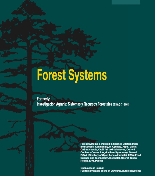
Forest Systems
Connecting research with practice in forest management and conservation.Forest Systems, an esteemed open-access journal published by CONSEJO SUPERIOR INVESTIGACIONES CIENTIFICAS-CSIC in Spain, has been a dedicated platform for advancing knowledge in the fields of ecology, forestry, and soil science since its inception in 1991. With an ISSN of 2171-5068 and E-ISSN 2171-9845, the journal is committed to disseminating high-quality research that addresses critical issues related to forest ecosystems and their management. Forest Systems is positioned within the Q4 category in Ecology, Evolution, Behavior and Systematics, and Q3 in both Forestry and Soil Science, evidencing its growing influence and relevance in these disciplines. Researchers will find a rich repository of articles that not only contribute significantly to academic discourse but also foster practical solutions to contemporary environmental challenges. As it converges from 2010 to 2024, the journal aims to enhance its outreach and impact, facilitating access for professionals, students, and policymakers committed to sustainable forest management and ecological conservation.
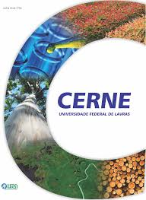
Cerne
Empowering Forestry Research through Open AccessCerne is a distinguished open-access journal dedicated to advancing knowledge in the field of forestry, published by the Universidade Federal de Lavras (UFLA). Since its inception in 1994, the journal has actively contributed to the global discourse on sustainable forest management and biodiversity conservation, presenting research findings that are both relevant and impactful. With its ISSN 0104-7760, Cerne aims to foster collaboration among researchers, professionals, and students, enhancing the understanding of forestry practices in Brazil and beyond. As of 2023, it holds a respectable Q3 ranking in the forestry category, further cementing its position within the academic community, illustrated by a Scopus ranking of #97 out of 174 in the Agricultural and Biological Sciences - Forestry field. Operating under an open-access model allows for wide dissemination of research outputs, ensuring that critical findings reach a broad audience, fueling further innovation and discovery in the field. With converged years extending from 2007 to 2024, Cerne continues to be a vital resource for anyone engaged in forestry research and practices.

Sumarski List
Innovating Conservation Strategies for Healthy ForestsSumarski List, published by the Croatian Forestry Society, serves as a key platform for the dissemination of knowledge and research within the field of forestry. Established in the early 1980s, this journal has maintained a consistent commitment to advancing the understanding of forest management, ecology, and conservation. With an ISSN of 0373-1332 and an E-ISSN of 1846-9140, it provides researchers and practitioners with valuable insights into current trends and practices in forestry, although it currently falls within the Q4 category in the 2023 forestry rankings. The journal is accessible primarily in printed format, promoting rigorous scholarship and discussion. The important contributions of Sumarski List are vital for fostering a greater appreciation of forestry in Croatia and beyond, making it an essential resource for those dedicated to tackling the pressing challenges in forest ecosystems.

FORESTRY CHRONICLE
Advancing forestry knowledge for a sustainable future.FORESTRY CHRONICLE, published by the Canadian Institute of Forestry, is a leading journal dedicated to advancing knowledge in the field of forestry and environmental science. With a rich history of dissemination of impactful research since its inception, this journal plays a crucial role in bridging the gap between theory and practice for professionals, researchers, and students alike. Based in Canada, the journal is indexed in Scopus, ranking within the Q3 quartile for the field of Forestry and demonstrating its commitment to quality and relevance in agricultural and biological sciences. While it does not currently offer open access, its circulation extends internationally, ensuring a wide reach for innovative ideas and findings in forest management, conservation, and ecological sustainability. As a vital resource, FORESTRY CHRONICLE continues to foster dialogue and collaboration among stakeholders invested in the sustainable use of forest resources, making it an essential addition to your academic repertoire.

Revista Forestal Mesoamerica Kuru-RFMK
Empowering knowledge exchange in forest management.Revista Forestal Mesoamerica Kuru-RFMK is a vital academic platform dedicated to the advancement of forest science and management within the Mesoamerican region. Published by the Instituto Tecnológico de Costa Rica, this journal has been an Open Access resource since 2011, ensuring that critical research is accessible to a global audience. With an ISSN of 2215-2504, it aims to foster collaboration and knowledge exchange among researchers, professionals, and students eager to address the pressing challenges facing forests in Central America. The journal prioritizes interdisciplinary studies related to forest ecology, conservation, and sustainable management practices, making it an indispensable reference for anyone interested in enhancing forest health and biodiversity. By contributing to this resource, scholars can impact policy and practice while enriching the academic community’s understanding of Mesoamerica's unique forest ecosystems.

Madera y Bosques
Exploring the Depths of Wood ScienceMadera y Bosques is a prominent academic journal specializing in the fields of forestry and wood science, published by INST ECOLOGIA A C in Mexico. With an ISSN of 1405-0471 and an E-ISSN of 2448-7597, it has established itself as a vital platform for disseminating research findings, innovative practices, and methodologies pertinent to sustainable forest management and ecological conservation. Operating since 2008, the journal covers a wide scope of topics related to the complexities of forest ecosystems, the importance of biodiversity, and the challenges posed by climate change. Despite its categorization in Q4 for the year 2023 in the Forestry category, Madera y Bosques aims to elevate discourse and practice in the field, providing a voice to emerging researchers and seasoned professionals alike. Additionally, the journal adheres to open access principles, enhancing the visibility and accessibility of its articles to a global audience. Researchers and practitioners are encouraged to engage with its rich content to further their understanding and impact in the world of forestry.
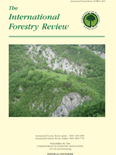
INTERNATIONAL FORESTRY REVIEW
Empowering Global Collaboration for Forest SustainabilityINTERNATIONAL FORESTRY REVIEW, published by the Commonwealth Forestry Association, stands as a vital resource for researchers, professionals, and students in the fields of ecology, forestry, and environmental science. With an ISSN of 1465-5489 and a robust E-ISSN of 2053-7778, this journal has been disseminating impactful research since its inception in 1999, and continues to do so into 2024. The journal enjoys a prominent Q2 ranking across multiple categories in 2023, including Ecology, Forestry, and Geography, Planning and Development, reflecting its significance in the scholarly community. Although it operates on a traditional access model, the content published is pivotal for advancing knowledge and addressing pressing issues in forest management and sustainability. Situated in the United Kingdom, the journal aims to provide a multidisciplinary platform that encourages collaboration among researchers and practitioners, ultimately fostering sustainable forestry practices worldwide.
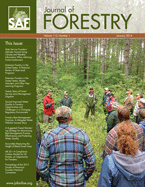
JOURNAL OF FORESTRY
Advancing sustainable forestry through cutting-edge research.JOURNAL OF FORESTRY, published by OXFORD UNIV PRESS INC, is a premier academic journal dedicated to advancing the field of forestry and plant sciences. With a distinguished history dating back to 1919, the journal has evolved to address contemporary challenges and innovations in these critical domains of environmental science. As evidenced by its impressive Q1 rankings in both Forestry and Plant Science categories for 2023, the journal is recognized for its contribution to scholarly research, occupying a significant position among its peers with a Scopus rank of #33 in Forestry and #122 in Plant Science. Researchers and practitioners can access the journal’s articles to stay updated on cutting-edge research, methodologies, and practices that influence sustainable forest management and conservation efforts. By fostering interdisciplinary collaboration, the JOURNAL OF FORESTRY plays a pivotal role in shaping the discourse surrounding forest ecosystems, promoting the integration of science with practice, and facilitating knowledge transfer in academia and industry. As a vital resource for researchers, professionals, and students alike, this journal serves as an essential platform for disseminating high-quality research that addresses pressing environmental concerns.

Journal of Forest Research
Innovating practices for a greener tomorrow.Welcome to the Journal of Forest Research, a pioneering publication dedicated to advancing the field of forestry and sustainable ecosystem management. Published by Taylor & Francis Ltd and boasting an impressive Q2 ranking within its category, this journal highlights significant research contributions and innovative practices in forest science. With an ISSN of 1341-6979 and E-ISSN of 1610-7403, the journal spans a fruitful history from 1996 and continues to be an influential platform up to 2024. The Scopus rank places it at an esteemed #55 out of 174 in the realm of Agricultural and Biological Sciences, reflecting its high impact within the community. While this journal is not open access, it offers targeted content for researchers, professionals, and students seeking to deepen their understanding of forest ecosystems and promote sustainable practices. Join us in exploring the intricate relationship between society and forests, and contribute to a crucial dialogue on environmental stewardship.
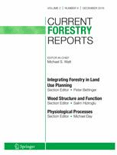
Current Forestry Reports
Navigating the future of forestry with groundbreaking findings.Current Forestry Reports, published by Springer International Publishing AG, stands at the forefront of forestry and ecological research, boasting an impressive array of quartile rankings in 2023 such as Q1 in Ecology and Forestry. With an ISSN of 2198-6436, this journal has emerged as a pivotal platform for disseminating innovative research findings and insights critical to the sustainable management of forest ecosystems. Operating out of Switzerland, it covers a broad scope that spans from ecological theory to practical forestry applications and landscape conservation. Notably, it ranks #3 out of 174 in Agricultural and Biological Sciences: Forestry and #4 out of 211 in Environmental Science: Nature and Landscape Conservation, reflecting its high impact and relevance in the field, placing it in the top percentiles in multiple categories. This open-access journal endeavors to provide a comprehensive understanding of contemporary issues, trends, and methodologies in forestry and related disciplines, making it an indispensable resource for researchers, practitioners, and students who are dedicated to advancing knowledge and practices in forest science.